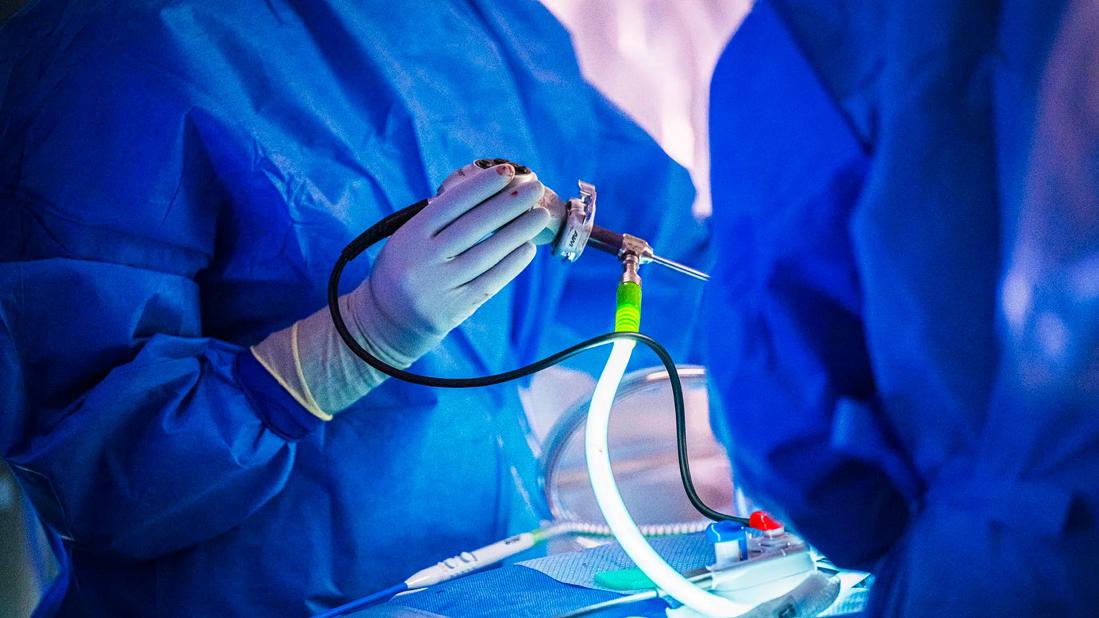Findings could help identify patients at risk for poor outcomes

Image content: This image is available to view online.
View image online (https://assets.clevelandclinic.org/transform/7841c2d8-ef50-4b2b-9abe-19ea08a4425e/bariatric-surgery-outcome)
Closeup of bariatric surgery
Metabolic bariatric surgery is well-established as an effective and durable treatment for severe obesity; however, some patients experience greater benefits than others. A new study shows that changes in the gut microbiome can help predict which patients will lose more weight.
Advertisement
Cleveland Clinic is a non-profit academic medical center. Advertising on our site helps support our mission. We do not endorse non-Cleveland Clinic products or services. Policy
The research by Cleveland Clinic clinician-scientists is the largest study yet to suggest that the gut microbiome plays an important role in bariatric surgery outcomes, and it’s the first to show that these results persist over time. The findings could pave the way for clinical interventions to help patients benefit more from surgery, says senior author Leslie Heinberg, PhD, Vice Chair of Psychology in the Department of Psychiatry and Psychology at Cleveland Clinic.
“This has important implications for identifying patients who may be at risk of suboptimal outcomes so we can potentially intervene earlier,” she says.
For the study, researchers tracked 124 patients undergoing metabolic bariatric surgery for obesity. They recorded each patient’s BMI and assessed their gut microbiome using metagenomic shotgun sequencing before surgery, one month after surgery and at six-month intervals over two years.
Although patients’ microbiomes did not differ significantly at the start of the study, the research group found that some participants microbiomes changed dramatically in the first weeks after surgery. Patients whose microbiomes changed experienced greater weight loss, while those with fewer microbiome changes experienced less weight loss. This association persisted for at least two years after surgery.
Dr. Heinberg says that the speed of change in the microbiome was unexpected because patients tend to eat similar, mostly liquid diets and have the same low activity levels in the first weeks of recovery after surgery.
Advertisement
“We were hoping to find some differences in people who had more optimal outcomes versus less optimal outcomes, but most surprising was that the differences were apparent so early on,” she explains.
Looking closer at the microbes themselves, Dr. Heinberg notes that Proteobacteria seem to be linked to better outcomes, particularly in patients who received gastric bypass surgery. However, more than any specific type of bacteria, it was the change itself that seemed to be most important — patients with the most changes to their microbiomes experienced the most weight loss.
Dr. Heinberg expects the findings will lead to more research.
“The study answered a few questions, but it raised even more of them,” she says. “We don’t quite know why these people are having so many changes, what mechanisms are behind it and how these changes translate into weight loss.”
Future studies could also investigate whether probiotics or dietary changes could increase the benefit to certain patients, leading to more personalized medicine.
The research group recently received funding from NIH for a five-year study to investigate how the microbiome influences reward pathways in the brain, such as driving food and alcohol cravings.
The team also hopes to investigate the role of the microbiome on outcomes with weight loss drugs like GLP1s.
“As with surgery, these medications are extremely effective, but the effectiveness varies among patients,” says Dr. Heinberg. “Could the microbiome be a predictive factor for these medications just like with surgery?”
Advertisement
The study, “Early Changes in the Gut Microbiota are Associated with Weight Outcomes Over Two Years Following Metabolic and Bariatric Surgery,” was recently presented at the annual ObesityWeek Conference in San Antonio and was published concurrently in Obesity.
Advertisement
Advertisement
Researchers explore how changes in the gut microbiome influence the brain's reward response to alcohol
Surgical intervention linked to increased lifespan and reduced complications
Retrospective study highlights psychosocial predictors of bariatric surgery outcomes
Comprehensive mental health screening may help prevent postsurgical risks
Consider each patient's unique disease progression and treatment goals when choosing a strategy
Sustained weight loss helps reduce IIH symptoms and medication dependence
Findings show greater reduction in CKD progression, kidney failure than GLP-1RAs
An individualized approach to care is still essential